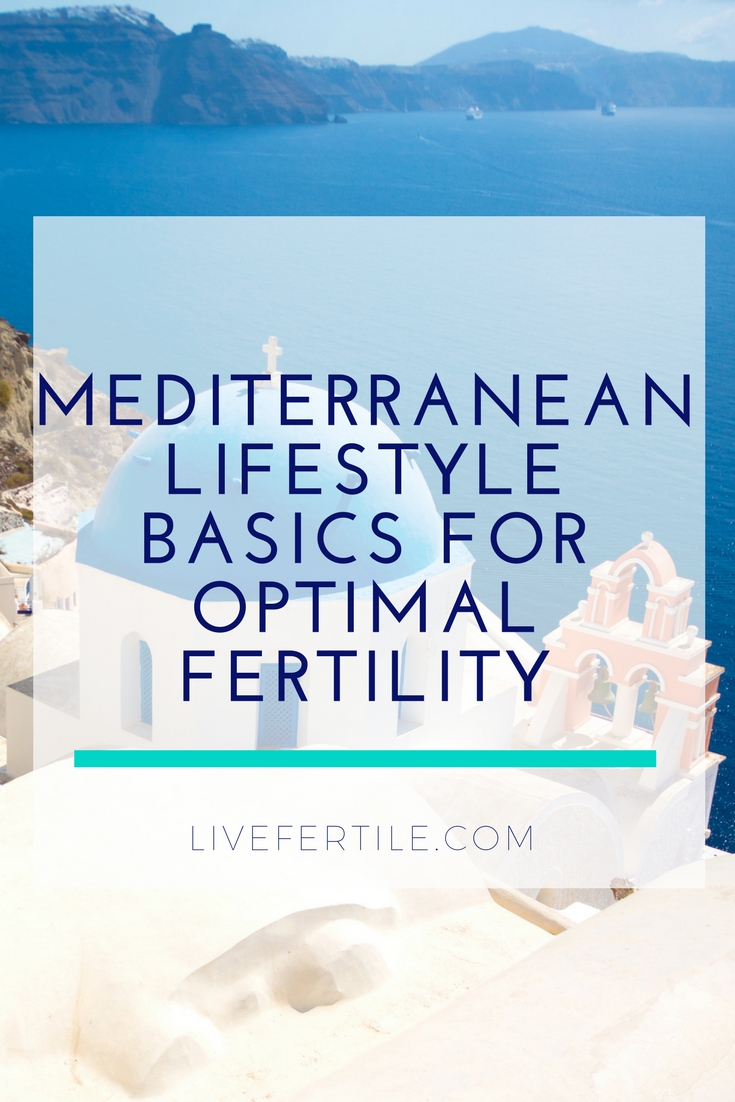Mediterranean Lifestyle Basics for Optimal Fertility
Next month is my second favorite month of the year (October for some inexplicable reason has always held the top spot in my heart.) I love May! For one, May is Mediterranean Diet Month. It’s also the month our attention turns to mothers and motherhood. And if you didn't know, I'm kinda obsessed with maternal health and women's health in general. Mother's Day serves as a reminder of the amazingly complex ways a mother’s body shapes her child before, during, and after her pregnancy.
At first glance, a connection between the Mediterranean lifestyle and maternal health isn’t readily apparent. But if we look at the research, we’ll find the former has the potential to positively affect the latter.
Before we dig into the impact the Mediterranean lifestyle has on fertility and maternal health, let’s define the Mediterranean lifestyle.
What is the Mediterranean Lifestyle?
The Mediterranean lifestyle includes the delicious and healthy eating pattern, a focus on fun functional movement, and the social habits of the traditional Mediterranean way of life. There’s plenty of research which details health benefit after health benefit related to following the Mediterranean lifestyle.
The healthy eating pattern is all about eating:
- plant based meals full of fruit, vegetables, beans, peas, lentils, herbs, and spices.
- ample amounts of healthy fats from olive oil, seafood, nuts, and seeds.
- limiting red meat and refined sweets
The other equally important parts of the lifestyle include:
- weaving enjoyable movement throughout your day
- spending time with people you like and love
- participating in activities that light you up
It’s pretty clear why the Mediterranean lifestyle is associated with improved health. And good health is one of the cornerstones of optimal fertility.
A Preconception Mediterranean Lifestyle Reduces the Risk of Infertility
In a 2011 study, researchers found following a Mediterranean diet before trying to get pregnant had a positive effect on fertility. Women who most closely followed a Mediterranean diet were less likely to experience difficulty getting pregnant compared to women who had didn’t follow a Mediterranean diet.
The Mediterranean diet also seems to positively affect in vitro fertilization success. In 2010, researchers interviewed 161 couples receiving IVF treatment. The couples who followed a Mediterranean diet were 40% more likely to conceive.
Adopting A Mediterranean Lifestyle for Optimal Fertility
Adopting a Mediterranean lifestyle is something you can easily do without flying off to a distant locale. All the makings of this fertility and health promoting lifestyle can easily be found right in your neck of the woods.
Here are 10 simple ways you can add a bit more of the Mediterranean approach to food, fun, and family to your life.
- Opt for olive oil for homemade salad dressing, as a great alternative to margarine for bread, and for low heat cooking methods.
- Enjoy at least one meal each day with some of your favorite people.
- Make community a priority. Reach out to those you love and let them know you’re thinking about them.
- Aim to fill at least half your plate with veggies at most of your meals.
- Eat low mercury, wild caught fish if seafood is something you enjoy.
- Add pizazz (and major health benefits) to your food by flavoring them with plenty of herbs and spices.
- Incorporate regular movement into your day. You can go for a walk at lunch with a coworker, take a stretch break every hour at work, or groove to your favorite music while you do chores.
- Keep red meat to a minimum by treating meat more like a seasoning or garnish and less like the main attraction in your meals.
- Mindfully enjoy the sensuality of food. Savor the aroma, taste, feel, appearance, and even the sound of our meals.
- Nosh on desserts featuring fruits and nuts.
As we celebrate both Mediterranean Diet Month and Mother’s day this May, consider adopting a Mediterranean lifestyle for improved health, enhanced fertility, and a thriving pregnancy.
Wait! Don't go yet!
In celebration of this momentous month, I'll be sharing a mediterranean meal or snack everyday in May. If you're not following me over on insta, click here and follow me so you can see and try all the yumminess I've got planned.
References
Toledo, E., Burgo, C. L., Ruiz-Zambrana, A., Donazar, M., Navarro-Blasco, Í, Martínez-González, M. A., & Irala, J. D. (2011). Dietary patterns and difficulty conceiving: a nested case–control study. Fertility and Sterility, 96(5), 1149-1153. doi:10.1016/j.fertnstert.2011.08.034
Vujkovic, M., Vries, J. H., Lindemans, J., Macklon, N. S., Spek, P. J., Steegers, E. A., & Steegers-Theunissen, R. P. (2010). The preconception Mediterranean dietary pattern in couples undergoing in vitro fertilization/intracytoplasmic sperm injection treatment increases the chance of pregnancy. Fertility and Sterility, 94(6), 2096-2101. doi:10.1016/j.fertnstert.2009.12.079
